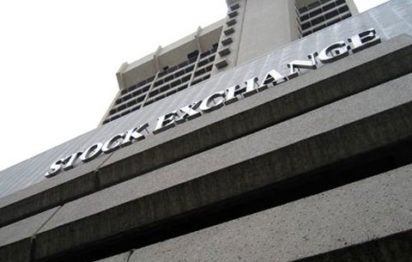- No movement at NASD OTC
By Omobayo Azeez
The Nigerian equities market remained unchanged from the red territory last week, leading to a capital loss of N399 billion.
Negative impacts of the troubled global economy triggered by Coronavirus and sharp decline in oil price drove the marked down by 3.5 per cent as the atmosphere remained gloomy and less vibrant.
Consequently, market capitalization slid to N10.994 trillion after shedding N399 billion while market benchmark index, the All-share index (ASI) lost 797.16 points week-on-week (WoW) to close lower at 21,094.62 basis points and the year-to-date return of the market settled at -21.4 per cent.
Analysing by sectors, significant losses were recorded in the banking and consumer goods indices -5.3 per cent and -3.9 per cent, and the duo were the primary drivers of the weak market performance.
Also, marginally losses were recorded in the Industrial Goods index at -1.7 per cent and Insurance index at -0.3 per cent, while conversely, only the oil and gas sector advanced by 2.3 per cent sector as the sole gainer.
This however the gain was not enough to turn the tide, given the magnitude of losses recorded in other sectors.
According to analysts at CSL, the trend witnessed this week is likely to persist, as weakened market sentiments are expected to pressure market returns. “Nonetheless, we advise investors to take a position in fundamentally justified stocks,” they counseled.
Commenting on the market posture, Sunny Nwosu, chairman emeritus, Independent Shareholders Association of Nigeria (ISAN), told business A.M that every investment decision taken by shareholders at point is guided by strict caution.
He said with the amount of fall already recorded in the market, it is difficult to predict a turnaround any time soon as the future remains bleak for the equities market.
Similarly, Ambrose Omordion, chief research officer at Investdata envisaged mixed performance as trading sessions in the remaining days of lockdown are still dicey, with market players likely to position ahead of Q1 2020 earnings reports and impact of the stimulus package on the economy in the midst of more companies notifying the exchange and investing public of its closed period 2020 first-quarter earnings report.
“However, the high dividend yields continue to attract buying interests, while more audited corporate earnings hit the market going forward. This is despite the likely continuation of the selloffs, with investors buying to increase their positions in undervalued stocks ahead of dividend declaration.
“This is also against the backdrop of the fact that the capital wave in the financial market may persist in the midst of relatively low-interest rates in the money market, high inflation and unstable economic outlook for 2020,” he said.
However, the Association of Securities Dealing Houses of Nigeria (ASHON) has assured the investing public that the market would soon bounce back.
Although ASHON acknowledged the high level of downswing on the market in the last couple of days, it stated that fundamentals of the quoted companies remain strong.
Oyinyechukwu Ezeagu, ASHON’s chairman, in a statement made available to newsmen, explained that Nigeria’s stock market remained part of the global exchanges and as such any development in the global market would impact on its operations.
“The effect of the coronavirus is gradually affecting trading all over the world and whatever happens elsewhere reflects in our market. The centre of it all is China and being a major world power both in productive and consumption capacities, any ill wind affecting China would naturally cause a big sneezing to the rest of world. Investors should not panic. The share prices will bounce back. The companies’ fundamentals remain strong. Many investors are taking advantage of the bearish run to beef up their portfolios,” said Ezeagu.
The numbers
Meanwhile, total turnover of 1.534 billion shares worth N11.267 billion in 18,928 deals were traded during the week by investors on the floor of the Exchange, in contrast to a total of 1.452 billion shares valued at N14.918 billion that exchanged hands previously in 21,828 deals.
NSE record showed that the financial services industry, measured by volume, led the activity chart with 1.105 billion shares valued at N7.100 billion traded in 12,225 deals; thus contributing 71.99 per cent and 63.02 per cent to the total equity turnover volume and value respectively.
The industrial goods followed with 218.471 million shares worth N1.236 billion in 1,610 deals, while the third place was the consumer goods industry, with a turnover of 134.599 million shares worth N1.855 billion in 2,332 deals.
In addition, trading in the top three equities namely, Sterling Bank Plc, Zenith Bank Plc and Meyer Plc, measured by volume, accounted for 752.359 million shares worth N3.247 billion in 4,039 deals, contributing 49.03 per cent and 28.82 per cent to the total equity turnover volume and value respectively.
Investors also traded a total of 6,759 units of ETPs valued at N61,035.98 in 19 deals, compared with a total of 20 units valued at N130.90 transacted in the previous week in 2 deals.
Similarly, investors traded a total of 10,100 units of federal government bonds valued at N11.145 million during the week in 2 deals, compared with a total of 28,527 units valued at N29.950 million transacted in the preceding week in 18 deals.
NASD
Meanwhile, the NASD OTC Security Index (NSI) and Market Capitalisation closed the trading week on Friday, with no movement in market capitalisation and NSI against preceding Friday, The NSI and market capitalisation closed the week at 692.71 points and N508 billion respectively.









